𝕋𝕙𝕖 𝔹𝕖𝕨𝕚𝕝𝕕𝕖𝕣𝕚𝕟𝕘 𝕎𝕠𝕣𝕝𝕕 𝕠𝕗 ℂ𝕙𝕣𝕚𝕤𝕥𝕠𝕡𝕙𝕖𝕣 𝕃𝕦𝕩𝕠𝕟 - 𝔻𝕠𝕟'𝕥 𝕪𝕠𝕦 𝕜𝕟𝕠𝕨 𝕨𝕙𝕠 𝕀 𝕒𝕞, 𝔹𝕠𝕥𝕥𝕠𝕞𝕗𝕖𝕖𝕕𝕖𝕣𝕤!
𝕋𝕙𝕖 𝔹𝕖𝕨𝕚𝕝𝕕𝕖𝕣𝕚𝕟𝕘 𝕎𝕠𝕣𝕝𝕕 𝕠𝕗 ℂ𝕙𝕣𝕚𝕤𝕥𝕠𝕡𝕙𝕖𝕣 𝕃𝕦𝕩𝕠𝕟 - 𝔻𝕠𝕟'𝕥 𝕪𝕠𝕦 𝕜𝕟𝕠𝕨 𝕨𝕙𝕠 𝕀 𝕒𝕞, 𝔹𝕠𝕥𝕥𝕠𝕞𝕗𝕖𝕖𝕕𝕖𝕣𝕤!
𝕋𝕙𝕖 𝕞𝕖𝕕𝕚𝕒'𝕤 "𝕙𝕠𝕟𝕖𝕪𝕞𝕠𝕠𝕟" 𝕨𝕚𝕥𝕙 ℕ𝕒𝕥𝕚𝕠𝕟𝕒𝕝'𝕤 𝕝𝕖𝕒𝕕𝕖𝕣, ℂ𝕙𝕣𝕚𝕤𝕥𝕠𝕡𝕙𝕖𝕣 𝕃𝕦𝕩𝕠𝕟, 𝕖𝕟𝕕𝕖𝕕 𝕒𝕓𝕣𝕦𝕡𝕥𝕝𝕪 𝕠𝕟 𝟚𝟙 𝕄𝕒𝕣𝕔𝕙 𝕨𝕙𝕖𝕟 𝕠𝕟 𝕂𝕖𝕣𝕣𝕖 𝕄𝕔𝕀𝕧𝕠𝕣'𝕤 ℕ𝕖𝕨𝕤𝕥𝕒𝕝𝕜ℤ𝔹 𝕤𝕙𝕠𝕨, 𝕙𝕖 𝕦𝕥𝕥𝕖𝕣𝕖𝕕 𝕥𝕙𝕖𝕤𝕖 𝕒𝕤𝕥𝕠𝕟𝕚𝕤𝕙𝕚𝕟𝕘 𝕨𝕠𝕣𝕕𝕤:
"If you want to have a go, and you want to make something of yourself -- we don't just do bottom feeding and just focus on the bottom. We focus on people who want to be positive and ambitious."T
here was stunned disbelief and one could almost hear the mainstream media draw in a collective shocked breath of disbelief: 'He said what !?"
It was as if a male guest at a feminist meeting had made an off-colour, sexist joke: Stunned silence. Disbelief. Dawning realisation.
For the msm, that "dawning realisation" was slow to happen. Only four media stories the following days referred directly in their headlines to the offensive disparagement of those at the bottom of capitalism's socio-economic ladder:
.

.
A RNZ 'Checkpoint' interview - whilst putting questions to Mr Luxon on this issue - made no specific reference to "bottom feeders" in their headline or webpage:
On those few occassions Luxon did appear in the media, he was at pains to "explain away" what was a patently obvious gaffe:
“My general theme there, John, was exactly what I just talked about before which was saying - look we want to have confidence, ambition, aspiration for all New Zealanders and we've got to celebrate that. It's important we celebrate that. What I was meaning there was the fact that the reality is we actually believe and want to help everybody who's doing it tough in this country as well and so we've got to care deeply about everybody.
What I meant is we celebrate the achievement, ambition and aspiration, but we also care deeply about people that are doing it tough. But what we don't have a lot of time for is frankly people that are, as we've seen in recent weeks, are people that are in state houses that actually aren't paying the rents, that are trashing the houses, abusing the neighbours. That's not fair on the other tenants, it's not fair on people that are doing it tough that we are trying to support and help, and that's not the New Zealand way. There are rights and responsibilities to this country and the way that we treat each other and how we look after and respect each other.”
What do National MPs really think of us?
— Frank - Solidarity with Ukraine! (@fmacskasy) April 28, 2022
I lay it all out. My latest in a series scrutinising the current Leader of the National Party...https://t.co/vwCJ3yQtaN
Good save. So it was all about "bad tenants"?
The issue quickly faded as the 24-hour news cycle moved on to new headlines; stories; and other clickable material.
Except... it wasn't just about "bad tenants" who were "in state houses that actually aren't paying the rents, that are trashing the houses, abusing the neighbours".
This was a slip that revealed the innermost private, deeply-held, repulsive attitude that the National Party holds toward the poorest people in our society. The poorest who have been marginalised whilst the richest have had seven tax cuts since 1986 and seen their obscene wealth explode.
It is not the first time National's mask has slipped, revealing the ugly psychopathy of it's hierarchy (and probably a good number of their base).
In the first few years of their 2008-17 term, then Welfare Minister Paula Bennett launched policies and rhetoric attacking welfare beneficiaries - especially solo-mothers (but, noticeably, not solo fathers):
It was all the more disturbing that Ms Bennett herself had once been a solo mother, on the then-Domestic Purposes Benefit, using the Training Incentive Allowance (which she dumped soon after being appointed Minister) to obtain tertiary education qualifications.
At the time, interviewed for TV3/Newshub, she reportedly said:
Ms Bennett, who famously put herself through university while a single mother on the DPB, said she was a "better mum" when she was working.
"It suited me. I actually needed the adult stimulation and my brain to be ticking over."
Which was not entirely true, as was revealed nearly three years later:
In an interview with the New Zealand Herald in 2008, Ms Bennett said she worked two part-time jobs each day but was driven back on to the benefit.
"I pretty much fell apart because I was exhausted. I went back on the DPB," she said.
None of which stopped her from attacking solo-mothers struggling to raise families. As pointed out above, that harassment was not meted out to solo-fathers.
But it cemented National's reputation as being "tough on beneficiaries"
Especially when, at the same time, then-Prime Minister John Key revealed to the entire country what he really thought about the Aotearoa New Zealand's poorest:
His comment left no room for doubt how National viewed welfare recipients and the poor. To re-cap:
“But it is also true that anyone on a benefit actually has a lifestyle choice. If one budgets properly, one can pay one’s bills. And that is true because the bulk of New Zealanders on a benefit do actually pay for food, their rent and other things. Now some make poor choices and they don’t have money left.” – John Key, 17 February 2011
Some National MPs expressed their born-to-rule arrogance at the rest of us even more openly. With brutal, honest, disdain, former National MP Aaron Gilmore became (in)famous for his now classic line:
“Don't you know who I am.”
The entire country soon knew who Mr Gilmore was. (Though the Otago Daily Timesaccidentally/on purpose got his name wrong in the above article's photo.)
Within two weeks he was gone from Parliament. Mr Gilmore had broken one of the cardinal rules of the Ruling Class: don't tell the plebes what you really think of them. (And definitely don't rub their noses in it.)
More recently, Mr Luxon's disdain at the poor and working class became apparent when - without any self-awareness - referred to "high calibre maori".
“Some really awesome high-calibre Māori reached out to me over summer. What's been interesting is it's since the leadership change, the reset and since we're focused on the right things, which is the people of New Zealand, not the National Party.”
The implication being blindingly obvious: the rest of us are not "high calibre". To him, the rest of us are lumpenproletariat, devoid of "fine breeding"; crass with our unrefined tastes; unappreciative of the crumbs that fall off the well-laden tables of our Betters.
This wasn't just elitist snobbery, it was putting 99% of New Zealanders firmly in their place.
And if New Zealanders think this doesn't affect them - they should think again.
National's culture of upper-class snobbery has translated into policy: this will affect their wallets and purses.
National has proposed tax cuts should it win the general election next year.
As has been well canvassed by now, their proposed tax cuts would give $2.15 per week for anyone earning up to $45,000 per year.
Meanwhile, someone on $150,000 per year would gain $20.06 per week.
Should Mr Luxon become Prime minister, and scrapping the top marginal tax rate of 39%, he would be $18,000 a year better off.
Pressed by veteran journalist/broadcaster, Jack Tame, on TVNZ's Q+A on 24 April, Mr Luxon was forced to concede:
“I would do very well because I'm a high-income earner. I'm above $180,000.”
Off course he admitted it. It would be difficult to hide his $18,000 per year extra income. Plus reinstating tax deductibility for his three rental properties, plus four others that he owns:
Luxon’s properties – a family home in Remuera, a Waiheke Island bach, an apartment in Wellington, his electoral office and three investment properties in Onehunga – now have a combined value of $21.145 million.
He and the other 1 Percenters of this country would do very well out of National's cash grab.
National says their tax cuts will cost around $1.7 billion dollars.
But, writing for Interest.co.nz, Jenée Tibshraeny factored in all of National's proposed tax changes. The cost of tax cuts became much higher, ranging from $2,010 billion next year to $2,895+ billion in 2023.
We have been down this road before. In 2010, to be precise, when National cut taxes and raised GST. The slashing of social services that followed created social problems that are with us today:
It was all the more disturbing that Ms Bennett herself had once been a solo mother, on the then-Domestic Purposes Benefit, using the Training Incentive Allowance (which she dumped soon after being appointed Minister) to obtain tertiary education qualifications.
At the time, interviewed for TV3/Newshub, she reportedly said:
Ms Bennett, who famously put herself through university while a single mother on the DPB, said she was a "better mum" when she was working.
"It suited me. I actually needed the adult stimulation and my brain to be ticking over."
Which was not entirely true, as was revealed nearly three years later:
In an interview with the New Zealand Herald in 2008, Ms Bennett said she worked two part-time jobs each day but was driven back on to the benefit.
"I pretty much fell apart because I was exhausted. I went back on the DPB," she said.
None of which stopped her from attacking solo-mothers struggling to raise families. As pointed out above, that harassment was not meted out to solo-fathers.
But it cemented National's reputation as being "tough on beneficiaries"
Especially when, at the same time, then-Prime Minister John Key revealed to the entire country what he really thought about the Aotearoa New Zealand's poorest:
His comment left no room for doubt how National viewed welfare recipients and the poor. To re-cap:
“But it is also true that anyone on a benefit actually has a lifestyle choice. If one budgets properly, one can pay one’s bills. And that is true because the bulk of New Zealanders on a benefit do actually pay for food, their rent and other things. Now some make poor choices and they don’t have money left.” – John Key, 17 February 2011
Some National MPs expressed their born-to-rule arrogance at the rest of us even more openly. With brutal, honest, disdain, former National MP Aaron Gilmore became (in)famous for his now classic line:
“Don't you know who I am.”
The entire country soon knew who Mr Gilmore was. (Though the Otago Daily Timesaccidentally/on purpose got his name wrong in the above article's photo.)
Within two weeks he was gone from Parliament. Mr Gilmore had broken one of the cardinal rules of the Ruling Class: don't tell the plebes what you really think of them. (And definitely don't rub their noses in it.)
More recently, Mr Luxon's disdain at the poor and working class became apparent when - without any self-awareness - referred to "high calibre maori".
“Some really awesome high-calibre Māori reached out to me over summer. What's been interesting is it's since the leadership change, the reset and since we're focused on the right things, which is the people of New Zealand, not the National Party.”
The implication being blindingly obvious: the rest of us are not "high calibre". To him, the rest of us are lumpenproletariat, devoid of "fine breeding"; crass with our unrefined tastes; unappreciative of the crumbs that fall off the well-laden tables of our Betters.
This wasn't just elitist snobbery, it was putting 99% of New Zealanders firmly in their place.
And if New Zealanders think this doesn't affect them - they should think again.
National's culture of upper-class snobbery has translated into policy: this will affect their wallets and purses.
National has proposed tax cuts should it win the general election next year.
As has been well canvassed by now, their proposed tax cuts would give $2.15 per week for anyone earning up to $45,000 per year.
Meanwhile, someone on $150,000 per year would gain $20.06 per week.
Should Mr Luxon become Prime minister, and scrapping the top marginal tax rate of 39%, he would be $18,000 a year better off.
Pressed by veteran journalist/broadcaster, Jack Tame, on TVNZ's Q+A on 24 April, Mr Luxon was forced to concede:
“I would do very well because I'm a high-income earner. I'm above $180,000.”
Off course he admitted it. It would be difficult to hide his $18,000 per year extra income. Plus reinstating tax deductibility for his three rental properties, plus four others that he owns:
Luxon’s properties – a family home in Remuera, a Waiheke Island bach, an apartment in Wellington, his electoral office and three investment properties in Onehunga – now have a combined value of $21.145 million.
He and the other 1 Percenters of this country would do very well out of National's cash grab.
National says their tax cuts will cost around $1.7 billion dollars.
But, writing for Interest.co.nz, Jenée Tibshraeny factored in all of National's proposed tax changes. The cost of tax cuts became much higher, ranging from $2,010 billion next year to $2,895+ billion in 2023.
We have been down this road before. In 2010, to be precise, when National cut taxes and raised GST. The slashing of social services that followed created social problems that are with us today:
Paula Bennett. Aaron Gilmore. John Key. And now Chris Luxon. When National MPs express contempt for "ordinary" New Zealanders, it is not a "slip of the tongue". They did not "mis-speak". It is actually how they view the rest of us.
A tax cut of $2 a week for low/middle income earners. A tax cut of $346 a week for multi-millionaire Mr Luxon, who "doesn't really need it".
Could it be any clearer?
Paula Bennett. Aaron Gilmore. John Key. And now Chris Luxon. When National MPs express contempt for "ordinary" New Zealanders, it is not a "slip of the tongue". They did not "mis-speak". It is actually how they view the rest of us.
A tax cut of $2 a week for low/middle income earners. A tax cut of $346 a week for multi-millionaire Mr Luxon, who "doesn't really need it".
Could it be any clearer?

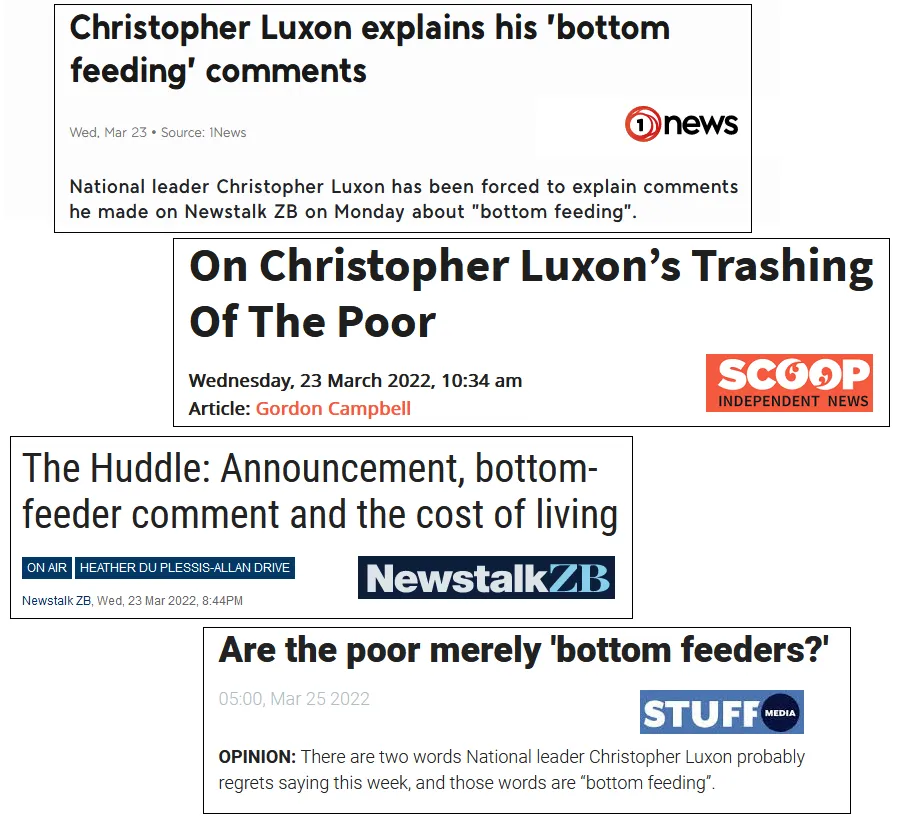
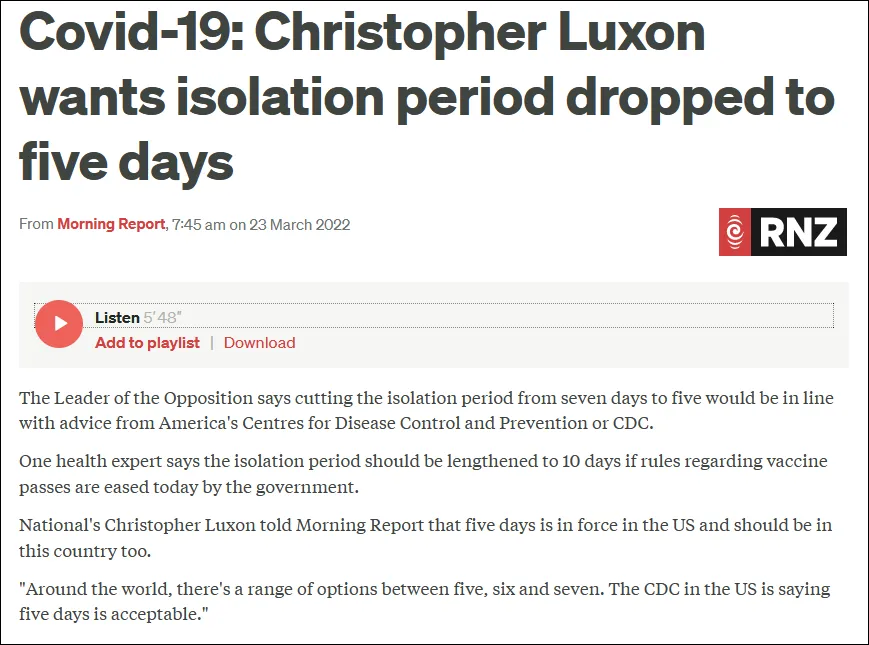
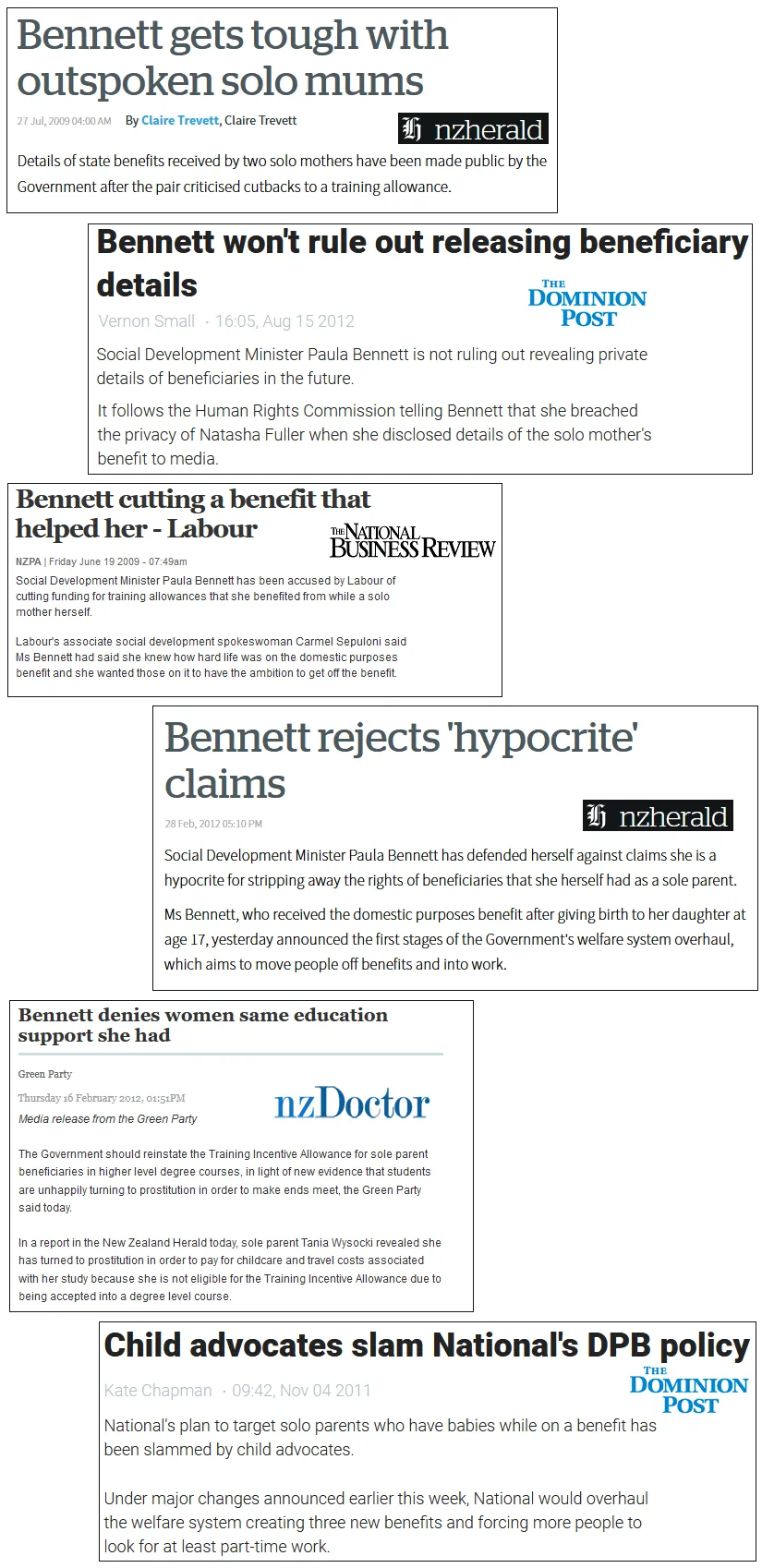

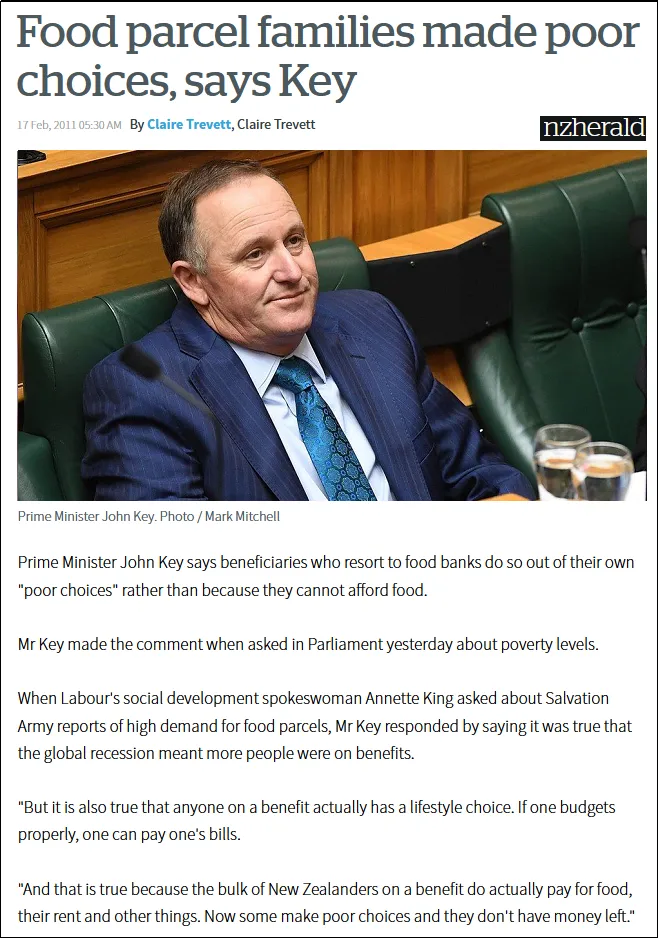


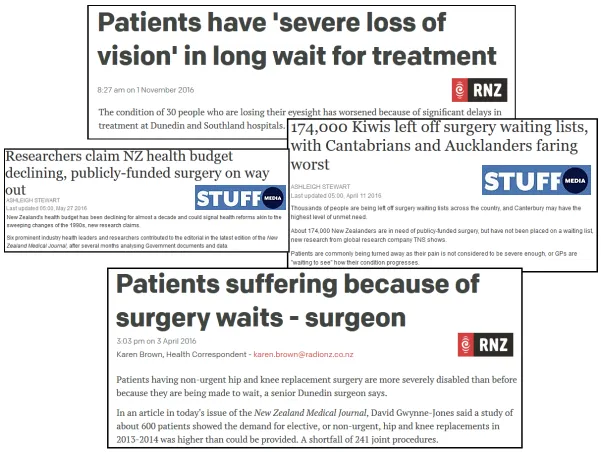

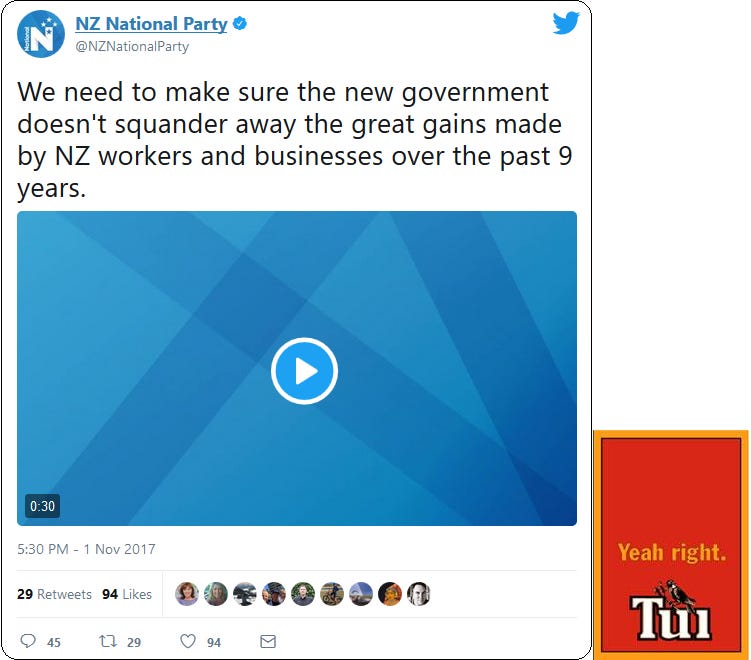



Comments
Post a Comment